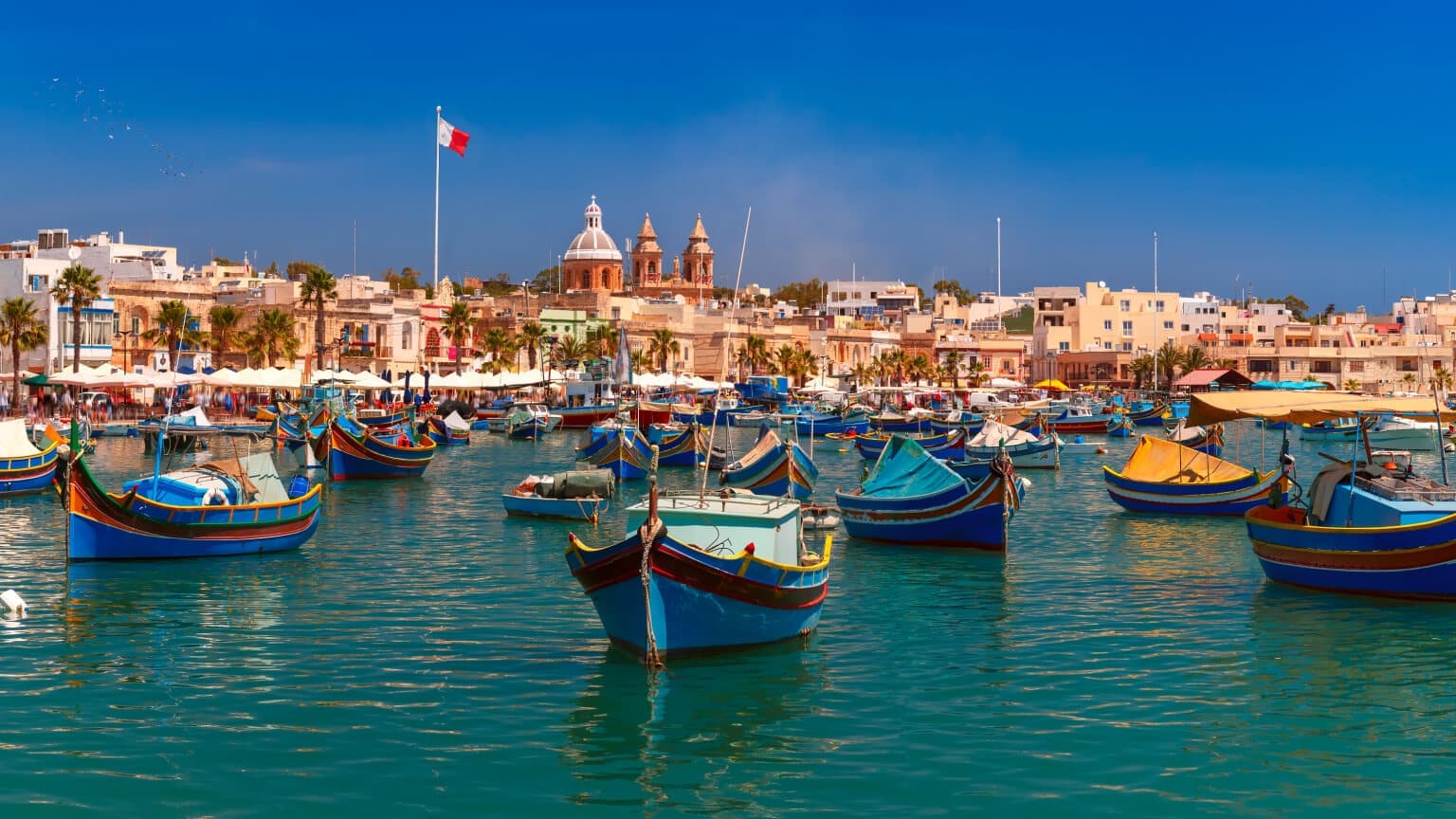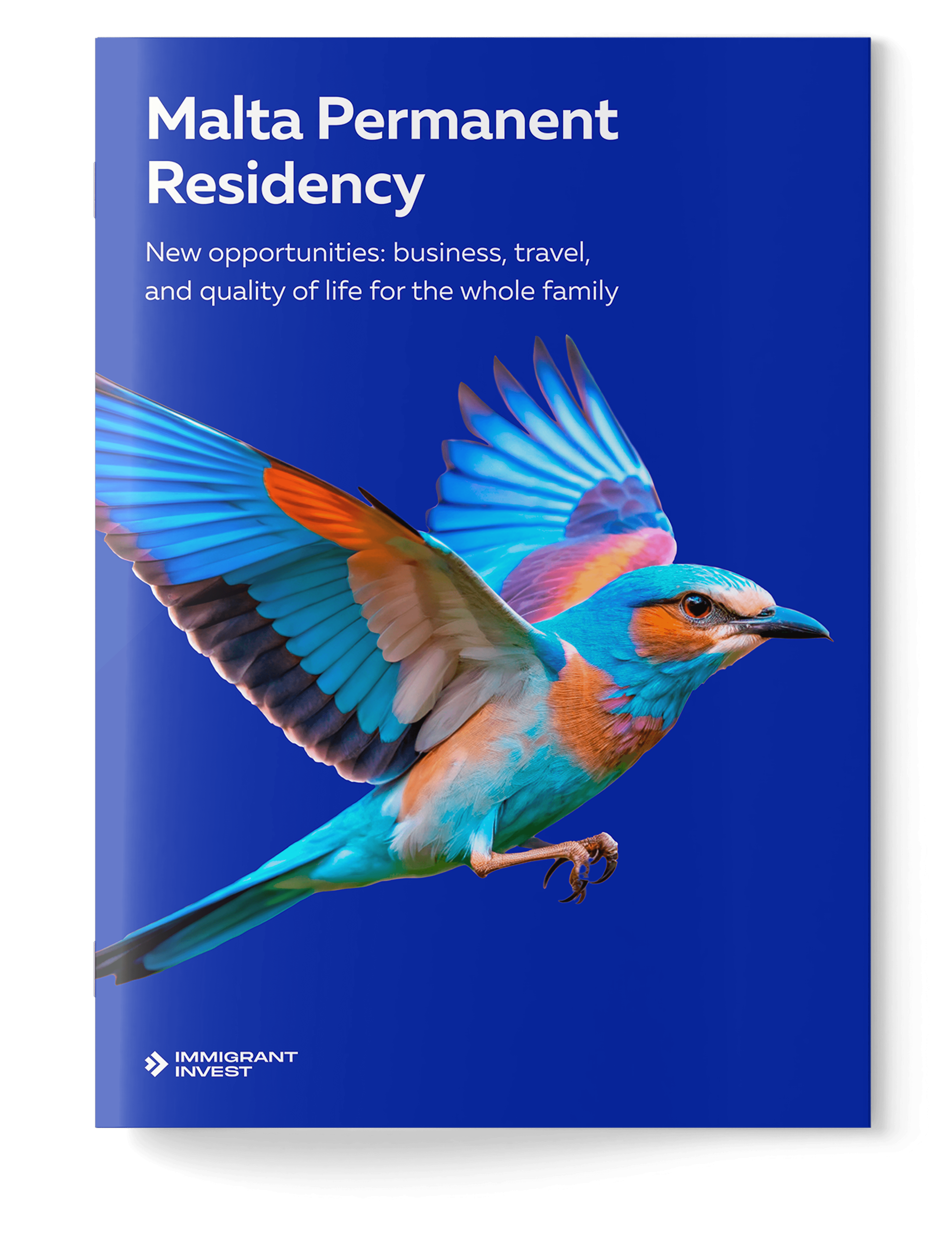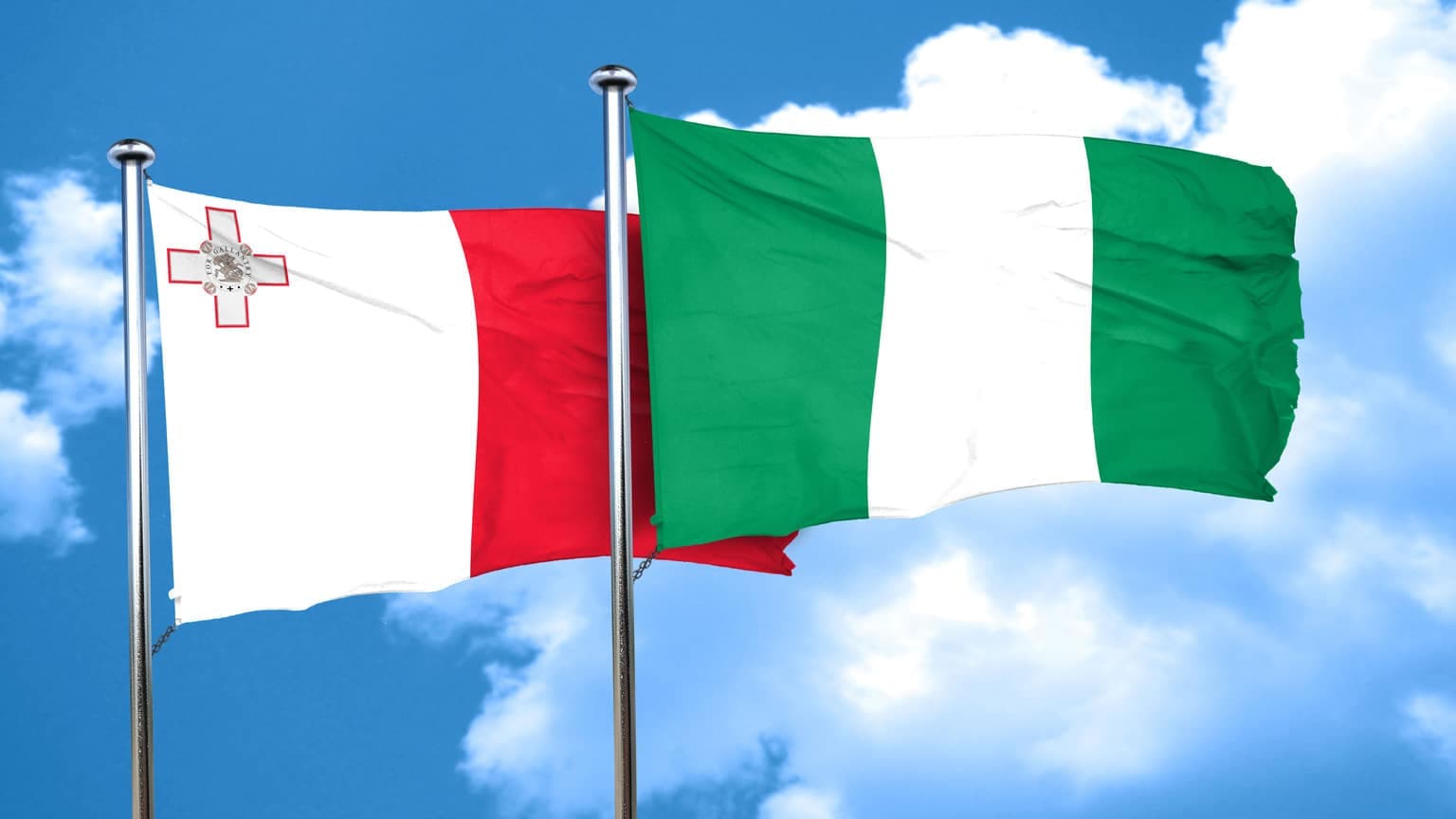Summary
Malta Permanent Residence Program allows wealthy foreigners to obtain a golden visa by investment. Applications are considered within 6 months.
Travelling around the Schengen Area, working, studying, and living in Malta with no limits is not a complete list of benefits. However, there are some disadvantages of the Malta residency obtainment process.
Malta program investment options
Malta Permanent Residence Program offers to obtain the status of a Malta permanent resident by investment. An applicant fulfils mandatory investment conditions:
-
makes a charitable donation;
-
pays administrative and state fees;
-
buys or rents real estate;
-
submits proof of capital of at least €500,000, including liquid financial assets of €150,000.
Immigrant Invest is a licenced agent of the Maltese program and is authorised to help investors obtain the status.
In many ways, Malta permanent residence program is more attractive than other non-investment ways to get residency in the country. But there are also some limitations. We suggest that you weigh all the benefits and requirements before opting for Malta’s permanent residence by investment.
Benefits of permanent residency in Malta
The Malta permanent residence program offers the fastest way to get permanent residency in the country. For comparison: permanent residence by naturalisation is expected for five to six years.
Most government programs for investors of the EU countries grant only temporary residence permits, renewed every year or two.
The Malta permanent residence program benefits:
-
fast obtaining process;
-
members of an investor’s family can also apply for permanent residency;
-
investments under the program are paid after Due Diligence;
-
residency status is granted for the whole life;
-
possibility to gain profit from investment in real estate;
-
no obligations to live in Malta.
The Malta PR program is the only one in the EU that does not impose age restrictions on family members. For example, in the Portugal residence permit program, children who are not older than 26 can participate.
The investor’s spouse is eligible to participate in the Maltese program. Marriage which is not officially registered is also allowed.

George, 32
A businessman from Ukraine
Malta permanent residency for a not married couple
George and Catherine planned to get permanent residence in Malta. But their marriage was not officially registered. Immigrant Invest helped prove the clients’ marital status, confirming Catherine and George’s co-residence and other bonds.
After receiving Malta residency permit cards, the investor and his family members enjoy all the privileges of permanent residency status, including immigrating to Malta.
Residence with visa-free Schengen travel
Malta PR program allows investors to live in the country without time limits. However, there is no condition to live in the country to remain a resident, so an investor may go there for vacation or not visit Malta for a long time.
A Maltese residence card allows you to travel freely within the Schengen Area without an additional visa. The allowed period of stay is 90 days every 180.
Studying in Malta
Diplomas of Maltese universities are valid in Europe and the USA. There are financial support systems in scholarships and tax deductions for talented students. For Malta residents, education in state universities is free.
High-quality healthcare
Holders of the residence permit have access to Maltese medicine. In terms of healthcare quality, the country is among the top 30 countries in the world: its scores are even higher than in the USA or Israel.
Profitable investment and business in Europe
Investors get an opportunity to expand their business and operate in Malta.
Purchasing lucrative real estate allows you to capitalise on your future by generating rental returns, with the prerogative to sell your assets after five years. Renting out residential real estate generates an income of 5 to 15% per annum.
Disadvantages of the Malta residence permit program by investment
Due Diligence for each family member
All program participants undergo a Due Diligence check.
A Due Diligence fee of €10,000 is payable when applying. If the application is approved, the fee is counted in the amount of subsequent mandatory payments for the program.
Children, parents, and grandparents must be financially dependent on the investor. They do not have to work and receive any income other than financial support from the primary applicant. Financial dependence has to be documented.
Non‑refundable payments
For any program of residence or citizenship, there are non‑refundable payments: these are duties and mandatory contributions to government funds.
Three non-refundable payments are made by the investor under the Maltese permanent residence program:
-
administration fee — €60,000;
-
contribution to the government fund — €37,000;
-
contribution to a non-governmental organisation — €2,000.
The total non-refundable expenses for the real estate purchase are €99,000. When renting, non-refundable costs include the cost of the lease itself for five years — €169,000 or more.
The rental cost requirement is €14,000 per annum. For five years of permanent residence, the non-refundable rental costs of housing may amount to €70,000 or more.
Registration address is needed at all times
To maintain the status of a permanent resident, one needs a registered address. Housing can be owned or rented — it doesn’t matter.
The investor can change the registration address. For example, an investor bought a property worth €375,000 and sold it five years later. Then they bought or rented another housing, but without regard to the financial conditions of the program. The investor submits a sale agreement and a new purchase or lease agreement to the program department.
Malta permanent residence program requirements
Who is eligible to apply for a residence permit in Malta:
-
age over 18 years old;
-
no criminal record or criminal prosecution;
-
no visa denials to countries that have a visa waiver regime with Malta;
-
ability to confirm the legality of the origin of the invested funds;
-
owning a capital of at least €500,000, of which at least €150,000 must be financial assets, or €650,000, where at least €75,000 are liquid financial assets.
Investors can choose between two investment opportunities — renting or buying real estate. The cost of purchase or rent stays the same no matter how many family members participate.
Malta residency visa costs
The contribution fee is increased by an additional €7,500 to include a family member aged 18 or over, excluding the spouse.
There are also additional cost items such as translation and apostille of documents and notary services of at least €5,000, as well as medical insurance of at least €500 per person. The law does not regulate these expenses, and investors choose insurance companies, notarial offices and translation agencies by themselves.
The Malta permanent residence program requires the following documents:
-
Investor’s passport.
-
Passports of all family members.
-
Cover letter.
-
Proof of having undergone the preliminary Due Diligence.
-
Proof you have the necessary funds for the investment.
-
Proof that you have obtained your funds legally.
-
Bank statements from your country of origin.
-
Marriage certificate.
-
Birth certificates.
-
Divorce certificate.
-
Custody documents.
-
Documents proving principal dependency for adult children, parents, and grandparents.
-
Biometric data for yourself and all applicants over the age of 12.
-
Police certificates, proving you do not have a criminal background.
-
Medical reports for yourself and your family. Medical reports are required to prove that the applicants do not have any contagious disease that could endanger public health in Malta.
The exact documents list will change depending on investment and family background.
How to buy property in Malta and get residency
Under the terms of the program, the investor rents or buys residential property in Malta. If the investor chooses to buy, then the property’s value must be at least €375,000.
Real estate in the north and the centre of Malta is more expensive than in other regions because they have a well-developed infrastructure. If an investor buys a property there, the real estate costs amount to 83% of the total costs of getting a residence permit.
Real estate owners may lease out their qualifying property temporarily when they are not residing in Malta.
After five years of maintaining the status, the property can be sold. Therefore, the investor will return 83% of the program costs.
By purchasing a property, it is possible to cover all the program's costs. The cost of housing in Malta is growing by about 4% per year. If you buy new apartments in a modern business-class residential complex, then in five years, their cost can rise by 20%.
The investor will return not only investments in real estate but also cover some costs of obtaining the status.
The main advantage of renting over buying is speed. Registration of the sale and purchase lasts a couple of months. Finding suitable accommodation and concluding a lease agreement in two weeks is possible.
How to get Malta permanent residency
If you decide to acquire a Maltese permanent residence by investment, please contact Immigrant Invest. The experts will carefully study your circumstances and aims, select the appropriate option and accompany you throughout obtaining a residence permit in 6—8 months.
1 day
Preliminary Due Diligence check
The investor undergoes an initial check against international legal and business information databases. They are also checked for harmful or compromising information materials on the Internet.
Our certified Anti-money Laundering Officer conducts a preliminary check to avoid rejection during the application process. Immigrant Invest has its compliance department, and our verification reduces the risk of rejection to 1%.
The investor undergoes an initial check against international legal and business information databases. They are also checked for harmful or compromising information materials on the Internet.
Our certified Anti-money Laundering Officer conducts a preliminary check to avoid rejection during the application process. Immigrant Invest has its compliance department, and our verification reduces the risk of rejection to 1%.
1+ months
Obtaining a temporary residence permit (optional)
Before submitting the full MPRP application, the main applicant and their dependants may get a 1-year temporary residence permit.
Applicants must visit Malta to submit biometrics. A fee of €100 per temporary residence card is paid.
Once submitted, the temporary residence application is processed within approximately 4 weeks. The cards must be collected in person from the Residency Malta office, either by our team or the applicant.
The full permanent residency application must be submitted within 6 months of receiving the temporary permit. If the MPRP application is refused, the temporary residence permit will be revoked within 15 days.
Before submitting the full MPRP application, the main applicant and their dependants may get a 1-year temporary residence permit.
Applicants must visit Malta to submit biometrics. A fee of €100 per temporary residence card is paid.
Once submitted, the temporary residence application is processed within approximately 4 weeks. The cards must be collected in person from the Residency Malta office, either by our team or the applicant.
The full permanent residency application must be submitted within 6 months of receiving the temporary permit. If the MPRP application is refused, the temporary residence permit will be revoked within 15 days.
1+ month
Collecting all the necessary documents
Immigrant Invest’s lawyers give an investor a list of required documents and help fill them out. They compile a history of the applicant’s assets, certify copies through a notary and fill out application forms correctly.
Immigrant Invest’s lawyers give an investor a list of required documents and help fill them out. They compile a history of the applicant’s assets, certify copies through a notary and fill out application forms correctly.
4—6 months
Due Diligence
Due Diligence is conducted by the Residency Malta Agency. Sometimes, the agency asks for additional information about the investor’s biography, business and finances.
Immigrant Invest’s lawyers prepare the documents, answer any questions together with the applicant and submit the answers to the agency.
The Due Diligence check takes about 6—8 months on average.
Due Diligence is conducted by the Residency Malta Agency. Sometimes, the agency asks for additional information about the investor’s biography, business and finances.
Immigrant Invest’s lawyers prepare the documents, answer any questions together with the applicant and submit the answers to the agency.
The Due Diligence check takes about 6—8 months on average.
Within 8 months after approval
Fulfilment of investment conditions
The Residency Malta Agency sends a notice of approval of the application to Immigrant Invest’s lawyers. As soon as the approval is received, the applicant fulfils the investment conditions within the stated period.
At the same time, the applicant needs to take out medical insurance with minimum coverage of €30,000 per person.
The Residency Malta Agency sends a notice of approval of the application to Immigrant Invest’s lawyers. As soon as the approval is received, the applicant fulfils the investment conditions within the stated period.
At the same time, the applicant needs to take out medical insurance with minimum coverage of €30,000 per person.
At least 1 day
Visiting Malta to submit biometrics
All people included in the application must travel to Malta and give their biometric data to the Residency Malta Agency.
This procedure takes place after the application has been approved. However, it can be done before all the investment conditions are fulfilled.
All people included in the application must travel to Malta and give their biometric data to the Residency Malta Agency.
This procedure takes place after the application has been approved. However, it can be done before all the investment conditions are fulfilled.
1 week
Obtaining final approval
The Residency Malta Agency reviews the additional documents that the lawyers submit after the investor has fulfilled all the program conditions. Then Immigrant Invest receives final approval of the application, which means that permanent residence cards will be issued for the applicants.
The Residency Malta Agency reviews the additional documents that the lawyers submit after the investor has fulfilled all the program conditions. Then Immigrant Invest receives final approval of the application, which means that permanent residence cards will be issued for the applicants.
2 weeks
Obtaining permanent residence cards
The Residency Malta Agency issues a Certificate of Residence and permanent residence cards and sends them to Immigrant Invest’s lawyers in Malta. These documents are then sent to the main applicants — they are not required to visit Malta to collect them.
The permanent residence cards for adult applicants are valid for five years. A new permanent residence card is issued a month after they turn 14 or 18 years old for younger family members.
The Residency Malta Agency issues a Certificate of Residence and permanent residence cards and sends them to Immigrant Invest’s lawyers in Malta. These documents are then sent to the main applicants — they are not required to visit Malta to collect them.
The permanent residence cards for adult applicants are valid for five years. A new permanent residence card is issued a month after they turn 14 or 18 years old for younger family members.
Key things about Malta permanent residence
-
To obtain Malta permanent residence, an investor buys or rents real estate, pays government fees, makes a donation, and confirms assets of at least €500,000.
-
The minimum investment amount under the Malta Permanent Residence Programme is €169,000 for renting a property and €474,000 for purchasing real estate.
-
Permanent residency in Malta grants lifetime rights to live in the country and access the Schengen Area for 90 days every 180.
-
The investor’s spouse, children under 29, parents, and grandparents are eligible to obtain permanent residence in Malta.
-
Investors are not required to live in Malta to obtain or maintain permanent residency.
Immigrant Invest is a licensed agent for citizenship and residence by investment programs in the EU, the Caribbean, Asia, and the Middle East. Take advantage of our global 15-year expertise — schedule a meeting with our investment programs experts.














